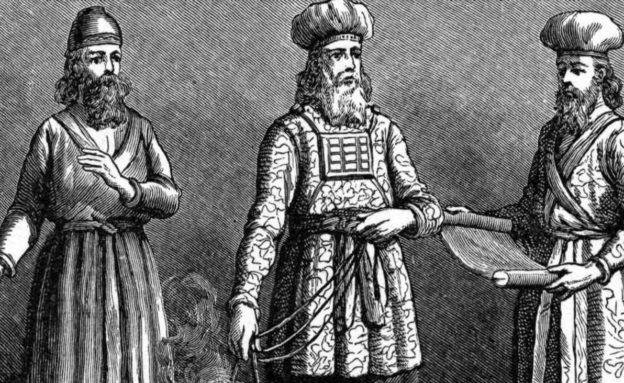Life is full of little routines: cleaning, brushing teeth, washing dishes. These repetitive tasks remove dirt, grime, germs, and plaque from our bodies and homes. Then they return, for cleansing again.
In our passage this week we see the ongoing requirements that continued the ordination process, and were repeated whenever there was a new High Priest. And we see the repeated sacrifices offered to cleanse the altar of ritual decay, and cleanse God’s People of their sins. All these rituals show the importance of Christ’s once-for-all sacrifice, that continually cleanses us anew.
After sprinkling the ordination ram’s blood on the priests’ garments to cleanse them, the priests still had duties to perform with the remains of the animal. Moses was to take the best and tastiest parts of the ram – the fat, the liver lobe and kidneys, and the right thigh – and along with the assorted breads (cf. v.2), place them in Aaron and his sons’ hands (vv.22-4).
They were then to wave these food offerings, perhaps up to the sky, or perhaps back and forth to represent the giving from and giving back to God, before casting these on the altar as a burnt offering (vv.24-5).
After this, Moses (acting as a temporary priest) and the newly ordained priests were allowed to take the meat of the breast and thigh (that not currently consumed by fire) as their own provision from God, via the people, for their share of the offerings given to God (vv.26-7). This was not a special one-off, but a perpetual rule that helped ensure the priests were well fed in their service of God and his people (vv.28-9). It was also a “good cut” of the meat, not the best, but not the worst either. On a scale of beaten-up Corolla to Tesla, it was a Leaf or an Outlander.
While these ordination rituals were lavish and extensive, they were also a repeated ritual. When Aaron died, his son as successor was to wear the same High Priestly clothes his father wore, and his sons after him (v.29). This ritual, which lasted seven days, would also last seven days for each successor (v.30).
Following the ordination ceremony, the priests cooked and feasted in their share of the offerings in an ordination meal, which was held in the sanctuary to ensure they remained ritually holy (vv.31-2). They were not to share the food with anyone else, and any leftovers were burnt the next morning, because they were sacred items (vv.33-4).
The ordination ritual extended seven days, and every day Moses was to sacrifice a bull as a sin offering for atonement for their sins, and to purify the altar of the “pollution” of sins effects (vv.35-6). This would set the altar apart as most holy, and anything which touched it (that is, sacrifices) would also be made holy through contact (v.37).
While the sacrifices of the ordination ritual were confined to the ordaining of a new High Priest, the altar was not left untouched. Each day, a lamb would be offered both morning and evening, marking the entire day as belonging to God (vv.38-9). These sacrifices were accompanied by other sacrifices which made the sacrifices resemble a meal (vv.40-41).
The daily sacrifices were to continue every day, as a perpetual reminder of the need to continually cleanse God’s People of their sins to enjoy God’s presence (v.42). All of the sacrifices, and the tabernacle, the altar, the lampstand, the ceremonies were directed towards this purpose.
When Moses constructed these items, and the priests did their part too, God promised to treat these as holy, and dwell there (vv.43-5). Through this, God’s People would come to know and enjoy the presence of their saviour from slavery in Egypt, their God.
Despite the uniqueness of this first ordination of the priests and High Priests, it was only the first of many more to come, as one High Priest died and a new one took their place. Even that ritual, conducted over seven days, involved repeated sacrifice for sin. And these ceremonies allowed for the daily sacrifices to continue in a way which God accepted, because they were offered in the way he demanded.
This repetition of events, daily and occasionally, reminded Israel that they needed continual cleansing from sin and its effects. We too, though redeemed, cleansed, and forgiven, also need daily forgiveness and cleansing from sin’s guilt and power in our lives.
Ultimately, the daily sacrifices of lambs could not truly cleanse God’s People of their sins. (Heb 10:3-4, Heb 10:11) Nor that of the bull, offered multiple times during the ordination of the High Priest. Only Jesus’ blood, the blood of one perfect human sacrificed in the place of many, can once for all satisfy the blood guilt we all bear because of Adam’s sin, and our sin.
That perfect sacrifice cleanses us anew every morning and evening, as we confess our sins to God. It allows us to enjoy what the tabernacle and priestly garments prefigured: God’s presence with us, his continually cleansed people.


